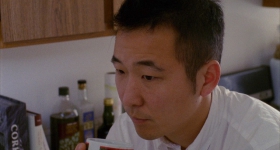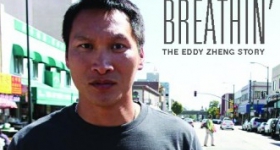After hearing Jennifer 8. Lee speak in April at the Asia Society, the same upper-east-side building where the festival is being held, and after writing about food here and there, I was hungry for more commentary on the American concept of Chinese food.
Lee's book, "The Fortune Cookie Chronicles," which I'll admit I still haven't read yet, actually talks in general about Chinese food in America, and the different variations of it. Hearing her speak about it left me questioning the origins of Chinese fast food in America, how it can be so different from Chinese food in China, and how non-Asian Americans perceive our food.
"The Killing of a Chinese Cookie," which focuses on the fortune cookie specifically, was a surprising eye opener for me, and parts of it were hilarious. I felt insulted and entertained at the same time by old pictures of white actors in yellowface, mildly offensive cartoons (like the Simpsons), comic book pages (Batman and Robin) and the big white guy in a Chinese silk jacket and hat failing to invoke traditions that he thinks still exist.
But while the ignorance decades ago about Asian food and culture in America was clear to me, the true origin of the cookie wasn't. I've always known that fortune cookies were an American invention, and that no one knows what the hell they are in China. In the film, they even said people in China who are offered the treat unknowingly eat it like a regular cookie, paper and all.
But the cookies aren't just American. They're Japanese American. While the Chinese-run Hong Kong Noodle Company claims to have been the inventor, it was actually invented by a Japanese baker in the early 1900s.
When the filmmakers brought the cookies to China, people didn't know what to make of them. When they brought them to Japan, people knew what they were, and knew they evolved from sembei, Japanese rice crackers.
Possibly the most edifying part of the film for me, however, was watching the cookie-making process, including batter mixing, griddle machines and fortune writing and printing. Each company had their own method. The noodle company used a big machine to make several at once, and the Japanese bakeries used individual presses. And the fortunes aren't all written by an old Chinese guy. One fortune writer is a girl in her 20s working at her dad's fortune printing business.
Another fun fact I learned from the film: P.F. Chang really does exist! I'd heard about the company (and one of my old coworkers used to call me P.F. Chang as a joke), but I thought P.F. Chang was just a name. A gimmick. A quick Wiki check tells me it's actually the combined names of two people, including one named Paul Fleming. In "The Killing of a Chinese Cookie," they interviewed the other half, Philip Chang, who told us what he thought about the fortune cookie and its place in Chinese American culture. He seemed like a reasonable guy.
The Asian American International Film Festival is happening in New York from July 10th - July 19th, 2008.
Althea Chang, a freelance writer/contributing editor for Hyphen, is guest-blogging.
This blog entry is graciously sponsored by Toyota Matrix. Check out their Director's Chair website dedicated to the best in Asian American film.









Comments